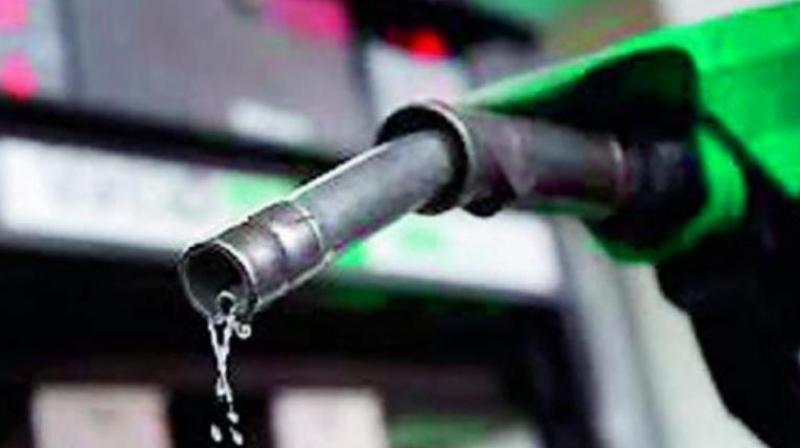Pain at the pump will impact 2019 poll scenario

The price of fuel at the pump goes up by the day now. An incremental rise of two or three paise a day per litre might not have been noticed for a while. The shock came with the monthly fuel bills rising and suddenly we are transported back to 2013 when so much anger built up against the then ruling UPA. The international prices then were extraordinarily high, ruling above $100 a barrel and not until the glut years came from 2015 did the prices barrel down.
A groundswell of anger this time around is rising even more noticeably because the average price per barrel, hovering around the $60-$65 mark for months, has shot up to $77. The arithmetic seems confusing as the price per litre at the pump was less when oil prices were ruling above the $100 mark ($104 in May 2014). But this is no great mystery as the answer lies in the Union government having hit the consumers with a prohibitive '22 per litre excise, having raised it from around '9, which was the excise when the international oil prices had slumped to below the $50 mark.
The scenario now, a year ahead of the polls of 2019 is the same in the sense that there is anger against the ruling dispensation. Only the parties are different. If Manmohan Singh’s administered pricing mechanism at a time when diesel prices were subsidised could do little for the common man who felt the pinch when riding into and out of the petrol bunks then, the government of the day seems determined to let the aam aadmi roast in the same high prices. All the signs are negative but the finance minister (unwell at the moment) has been unable or unwilling to ease the burden.
The states are also to blame. The BJP-led NDA is in power in more than 20 states now and yet only four have been found willing to cut their VAT to help reduce prices at the pump. The Centre and States are equally greedy for revenues and petrol-diesel has become the cow they have been milking away.
The Centre dropped excise by Rs 2, sacrificing nearly Rs 26,000 crore in. year, but that has hardly made a ripple. Pump prices are near or above an all-time high for both fuels, with the cost of diesel certain to have an inflationary effect even as the price of petrol pinches the middle class who use a two-wheeler for commuting.
The Congress has been vocal about this, as they must because the high prices of fuel were a big election issue in 2014 when they were routed. The former finance minister P. Chidambaram has used terms like “anti-poor” and “anti-middle class” against a government that seems to believe in “cruel taxation” after “imprudent borrowing”. Let me just say that it is difficult to find lucid arguments against those assertions. From $104 in May 2014, the price of a barrel of oil had fallen well below $50 before rising in the last few months to settle at around $77 in April 2018.
The government was clever in stepping up its act of mopping up revenues of about '7.35 lakh crores to buttress government revenue receipts and curtail the deficit at a time when prices were soft. It would have made sense then to reduce the excise proportionately to let the fuel prices settle at around the '60 per litre mark. India now sells the most expensive fuel in South Asia. While we can’t imagine selling a litre of petrol at 75 paise as in Venzuela, nor can we go to above the '100 per litre mark as in the Scandinavian countries.
The solution everyone is suggesting now, including the government, is to include fuel in GST. But even at the 28 per cent slab, both the Centre and the states would be hit in their collections as 14 per cent of say '60 a litre pricing would be nowhere close to what the Centre is getting by way of revenue from '22 a litre as excise and the states which take almost as much. And since they refuse to contemplate such a GST move - which is also impossible in the current political scene that has already heated up pre-national polls - it is the common man who has to continue to take the hit on his purse. So “cruel taxation” it shall be and never mind if this could swing the national polls against the NDA.
Over 80 per cent of it may be imported, but fossil fuel is still the golden goose.
The government would have to take action very soon if it is to change its image from that of a regime that does not care for aam aadmi. That impression has already set in from a Budget that was seen as anti-middle class from a finance minister who did not care to give any kind of decent relief from a welter of price rise conditions. If the fuel prices are dropped later in the year, closer to the general elections, it would be seen as a poll gimmick. The government is in a cleft stick, but inaction would doom it from the public point of view. They cannot say they have not been warned.
(R. Mohan is the Resident Editor of the Chennai and Tamil Nadu editions of Deccan Chronicle)

